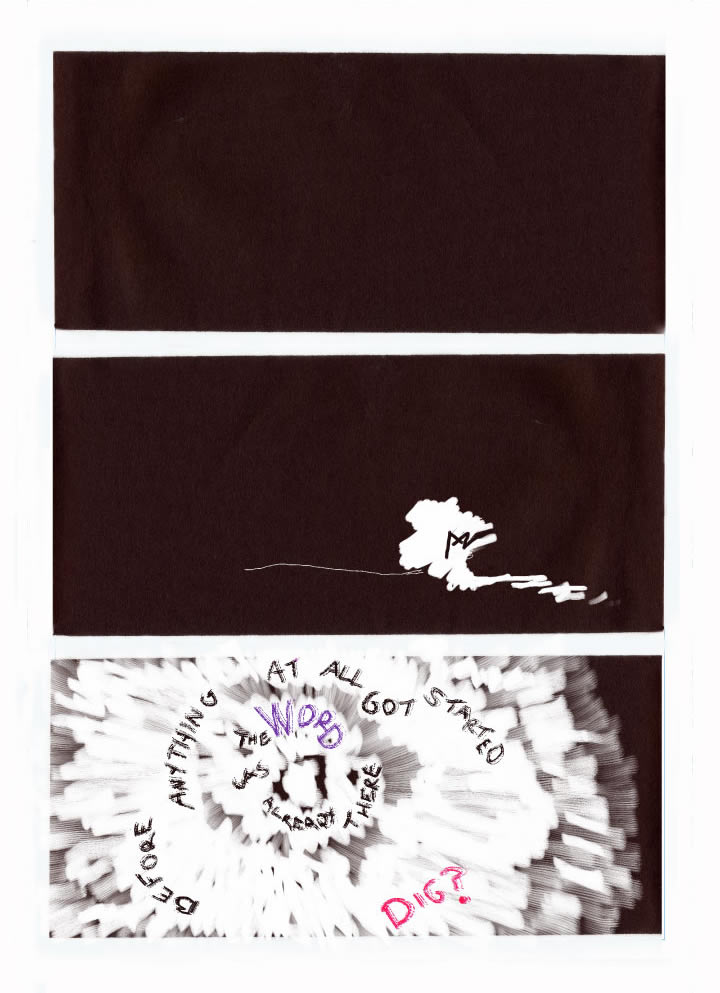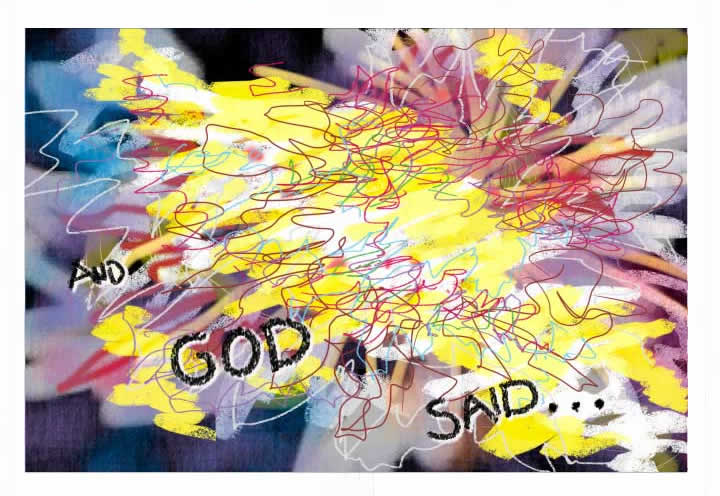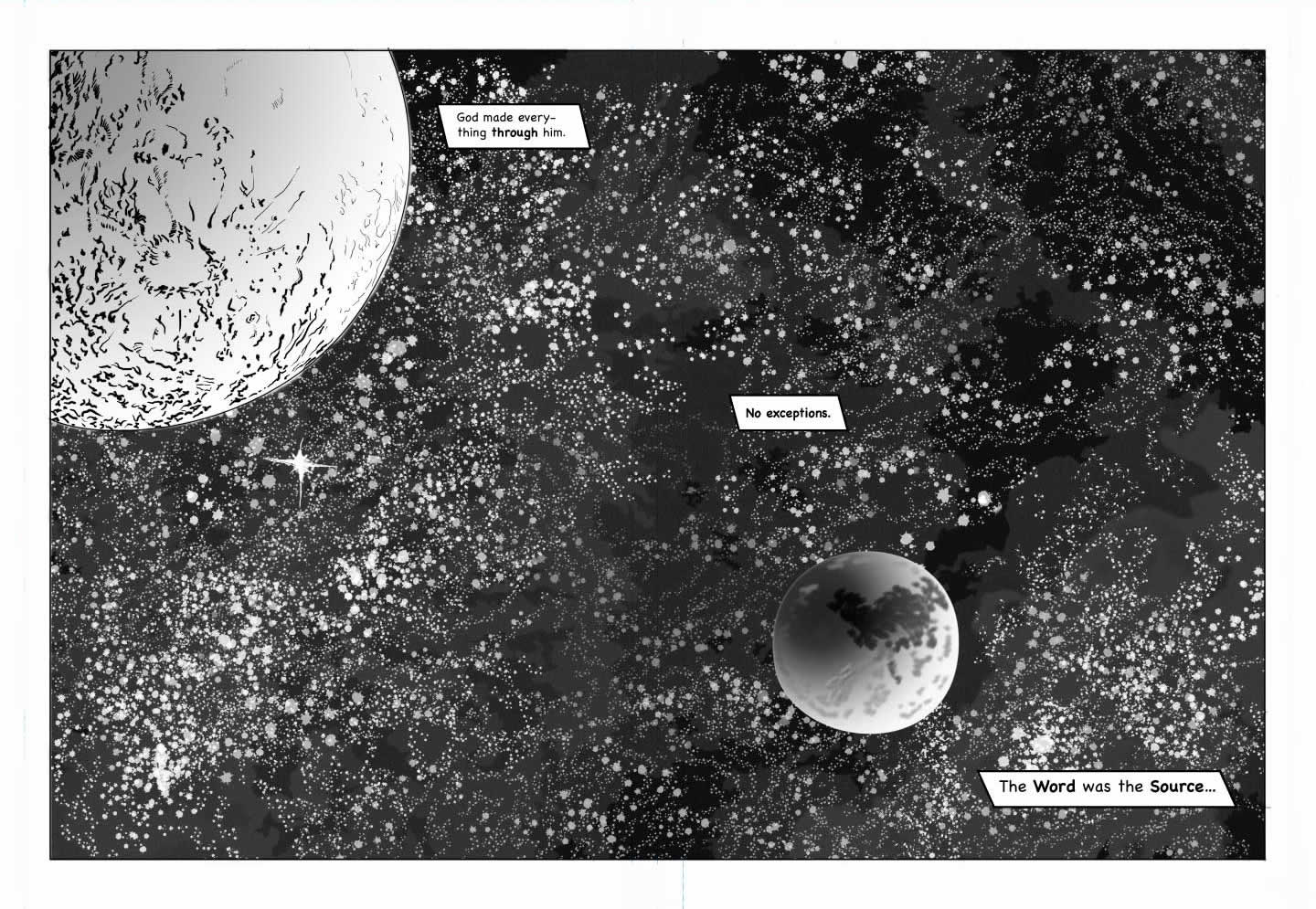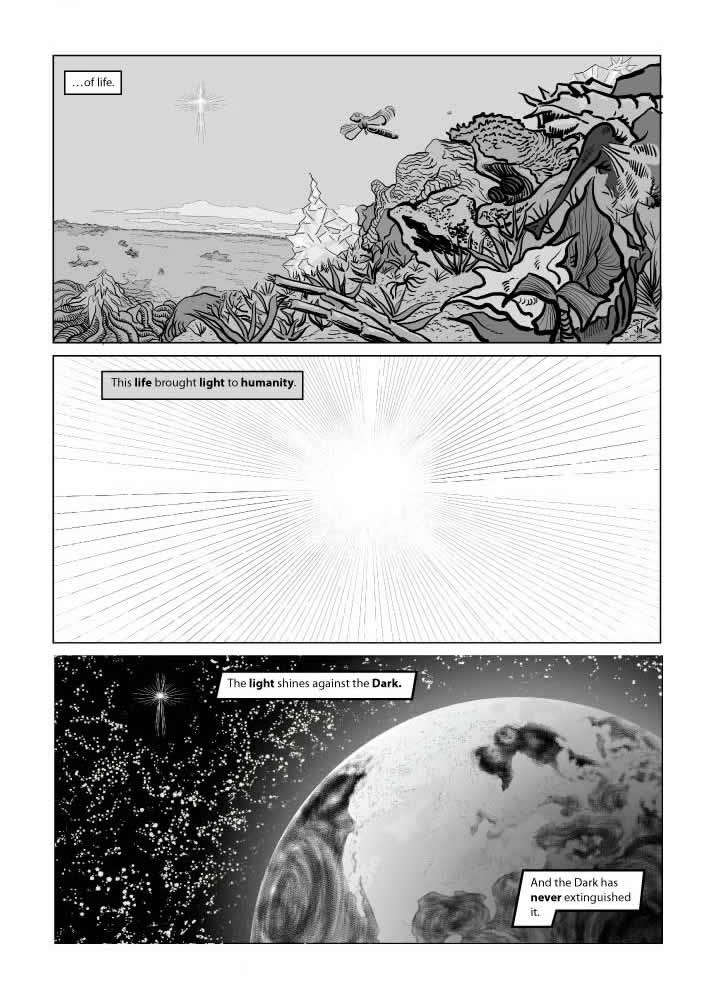Ole John's Groovy Buzz
Beginning of the Beginning's Beginning










While the myth of the dying and resurrected god is as old as Egypt and Babylon, and it could pre-date city life for all we know. The various and sundry creation myths go back at least as far, early versions perhaps pre-dating homo sapiens. What we have above is a graphic paraphrase of a sectarian reformulation of a Hebrew riposte to the Enūma Eliš, a Babylonian creation story that the Babylonians themselves inherited and fleshed out from their Sumerian precursors. The trail ends there.
This hymn to the Word is also formed from panegyrics to wisdom.1 In the Hebrew scriptures and the Septuagint, their translation into Greek, God employs wisdom to create the world and "by wisdom [makes] the heavens" (Psalm 104:24). Similarly, the gospel text and in the comic here everything is created through the Word. Proverbs 8 imagines personified Wisdom as calling out on the hilltops, in the roads, at the city gates for men, sons of men, and fools to come to their senses and learn discernment, an invitation perpetually shunned, just as the Word, in a passage not rendered above, "came into the world, but the world knew him not; came unto his own, and his own received him not."
What is an obvious figure of speech in
Behind the English "Word," traditionally favored by those who translate this passage, is the Greek term, logos. This isn't a faulty choice; even though it does leave something out of the story, which is why preacher often gloss this passage, as I'm doing here, with reference to the language of the source text. Logos previously appeared in Heraclitus and Parmenides to refer to the rational principle that organizes all things.
In choosing logos, for a figure who assumes the role of Wisdom, the Logos hymn cashes in on the philosophical resonance of logos while avoiding use of sophia, a noun of feminine gender, the usual Greek translation of the Hebrew chokhmah, the word for Wisdom used in Proverbs 8. It was beyond the capacity of the author of the gospel attributed to John, son of Zebedee, whoever he really was, to imagine God the Daughter Who accompanied the Father at the dawn of creation.
The likely immediate inspiration for this song to the incarnate Logos is probably a hymn contained in the Pauline letter to the Colossians, verses 1:15-17, if not some other Christian expression very much like it:
Image of the God we cannot see, out of all creation He was born first, for everything in the skies and on Earth were created through Him… He was there before anything was created, and in Him everything coheres.
Not that the genealogy of the logos hymn, the fact that it has a genealogy, needs distract from its power as myth. For myths can be coined, they can become outworn, as this one has for so many of us, and they can be replaced, but they are rarely utterly destroyed. Elements and patterns of discarded myths will reappear in surprising guises. We ourselves often find myths in pop culture fantasies, such as that of Kal-el, the Superman from an unstaßble, exploding planet, with an origin that echoes both the Noah myth and the Mosaic birth narrative. The early proclaimation of the resurrected Christ Jesus origniated as a subversive, underground current, probably in a marginalized Galillean culture. It later became the central motif of a new orthodoxy, which would ungraciously and ungratefully persecute the peoples whose ancestors unwittingly formed the new religion, giving the newcomer the patina of antiquity.
For people who inhabit a myth, it often assumes the feel of Reality itself. Hence some of you may bristle at what seems to you my cavilier and careless handling of the Jesus story. I get that. But I regard Jesus much as you regard Marduk, Zeus, and Thor, as the products of a collective imagination that signifies poetic truths, limited by the perspecitves and prejudices of the times of their popularity. Real enough that inhabiting these myths feared ecountering them in the woods while hunting, in the seas while sailing, on open ground during thunderstorms.
That Logic played a role in the formation of the cosmos is uncontroversial. That Logic should assume human form and walk amongst us is an instructive fantasy. Just what would we expect if that should happen? Humans of some sort scorn and assail Logic everyday. They murder the messengers of Logic and other truth tellers with disquieting frequency. Yet you can't kill a quality inherent within the very nature of things.
Notice the lexical sleight of hand I just performed? It makes an abstract telling of the Christ myth relevant to the most persuaded atheist. Neither true nor false, unlike their elaborations, myths are endlessly suggestive, ceaselessly interpretable, however much the True Believers of all species may wish it otherwise. To believe in a myth, to take it on faith and thus take it for granted, is to no longer listen to what it has to say, see what it has to reveal. Poets qua poets give voice to the Mystery; theologians qua theologians distort, even stifle that voice. This is the paradox of myth.
Should you suspect that I have a love/hate relationship with this gospel, which is filled with as much venom as poetry, you'd be correct. The John gospel's hard and fast binary of light versus dark is particularly simpleminded. When all is light without shadow, we cannot see. I recommend counter-balancing this gospel, the NT as a whole, with a meditative reading of the Tao Te Ching.
Recognize white,
yet grasp black:
provide the world a scale.
If you are a scale,
the Way will express its power within you
1I derive this tracing of the Christ myth as an evolutionary development of esoteric Jewish wisdom literature from G.A. Wells, The Jesus Myth.